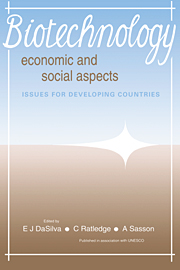Book contents
- Frontmatter
- Contents
- List of contributors
- Preface
- 1 Biotechnology: the socio-economic revolution? A synoptic view of the world status of biotechnology
- 2 Bioethanol production: economic and social considerations in failures and successes
- 3 Biofertilizers: agronomic and environmental impacts and economics
- 4 Microalgal biotechnology: is it an economic success?
- 5 Production of useful biochemicals by higher-plant cell cultures: biotechnological and economic aspects
- 6 Mushroom production – an economic measure in maintenance of food security
- 7 The economic viability of Single Cell Protein (SCP) production in the twenty-first century
- 8 The impact of biotechnology on international commodity trade
- 9 Biotechnology: socio-economic considerations, intercultural perspectives and international viewpoints
- 10 Joint microbial biotechnological ventures in developing countries: social promises and economic considerations
- 11 The economic and social implications of gene technology to developing countries
- 12 Making biotechnology appropriate – and environmentally sound
- 13 Information support for research and development in biotechnological applications
- 14 The effects of emerging biotechnologies on plant and animal agriculture – a viewpoint
- Index
2 - Bioethanol production: economic and social considerations in failures and successes
Published online by Cambridge University Press: 04 August 2010
- Frontmatter
- Contents
- List of contributors
- Preface
- 1 Biotechnology: the socio-economic revolution? A synoptic view of the world status of biotechnology
- 2 Bioethanol production: economic and social considerations in failures and successes
- 3 Biofertilizers: agronomic and environmental impacts and economics
- 4 Microalgal biotechnology: is it an economic success?
- 5 Production of useful biochemicals by higher-plant cell cultures: biotechnological and economic aspects
- 6 Mushroom production – an economic measure in maintenance of food security
- 7 The economic viability of Single Cell Protein (SCP) production in the twenty-first century
- 8 The impact of biotechnology on international commodity trade
- 9 Biotechnology: socio-economic considerations, intercultural perspectives and international viewpoints
- 10 Joint microbial biotechnological ventures in developing countries: social promises and economic considerations
- 11 The economic and social implications of gene technology to developing countries
- 12 Making biotechnology appropriate – and environmentally sound
- 13 Information support for research and development in biotechnological applications
- 14 The effects of emerging biotechnologies on plant and animal agriculture – a viewpoint
- Index
Summary
Introduction
In the past decade world-wide interest in alcohol fuels, particularly bioethanol, has increased considerably. In developing countries this has been mainly due to the combination of low feedstock cost (sugarcane) and low sugar prices in the international market, and also for strategic reasons. In the industrial countries a major reason is the increasing environmental concern, and also as a way of solving wider socioeconomic problems, such as agricultural land use and food surpluses.
Free-market microeconomics of bioethanol are still unfavourable relative to oil derived fuels, although there are many forms of renewable energy technologies which are now competitive in cost with nuclear and fossil fuels under specific conditions. There are also many non-economic factors (social, political, environmental, strategic) that should be considered. In addition, the use of renewable energy sources, contrary to conventional energy sources, produces very few or no external costs and may even cause positive external effects. The cost of bioethanol in the absence of direct or indirect subsidies still remains a serious obstacle to its widespread use. There are, however, a number of alternatives, including better use of by-products, that if pursued further could significantly reduce production costs.
Successes and failures in the bioethanol production and use are usually the consequence of a mixture of economic, political and technical reasons. Although economics play a significant role, it is often the case that clear political objectives and commitment will lead to success; the opposite usually results in failure.
- Type
- Chapter
- Information
- Biotechnology: Economic and Social AspectsIssues for Developing Countries, pp. 23 - 54Publisher: Cambridge University PressPrint publication year: 1992
- 2
- Cited by



